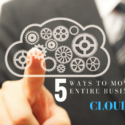What to Consider When Choosing a Cloud Service Provider?
With the expansion of cloud technology in the recent years, cloud software and platforms have become the norm for businesses of all sizes. The cloud is growing continuously, and its market will just get bigger as predicted by IDC that the investment will cloud services will exceed $500 by 2020. As per the latest reports from Forrester, the cloud is cannibalizing traditional on-premises technology, and the cloud is going to stay.
With so many cloud service providers offering different levels of IT support and control, choosing the right service provider has become a tough task. As the cloud marketplace is becoming wider with new deployment options and platforms, businesses need to consider every aspect related to their growth when choosing a cloud enterprise software system.
Along with the required level of functionality to cater the end goal, the service provider needs to have the type of deployment that aligns with IT infrastructure of businesses. Firstly, organizations need to make a decision what level of cloud services they need and whether to go with a public cloud or private cloud.
Just like any other software decision, criteria such as fit, ROI, and risks have to be weighed before choosing a specific vendor.
Technologies & Service Roadmap
Before making a decision to move your entire business in cloud, make sure the service provider’s platform align with your current environment, and preferred technologies support your cloud objectives.
Further, the provider’s standards, architectures, and services go with your management preferences and workloads. Businesses need to evaluate the extent of re-coding or customization they have to do to align their IT infrastructure with the platform of their service providers.
Look for a service provider which offers comprehensive migration services and round a clock assistance during assessment and planning phases. You need to have an understanding of the support on offer and map this against your tasks to decide who will do what. Mostly, the service providers
support technical staff to help your team successfully migrate to the cloud.
Though some large-scale public cloud providers provide limited assistance, and you may require third-party support to help your team understand what cloud is and how they can automate their operations through the cloud.
You can also provide training like AWS training to your team to make them understand everything related to cloud computing
Certifications
Obviously, every cloud vendor would claim about security and compliance with their services. But a cloud client cannot trust on the quality of services without verification of the third party.
A reliable cloud provider should have evidence of certification and auditing for industry-standard data center along with security certifications.
The most important certifications that cloud client look out for are:
- PCI DSS for processing and storing credit card data.
- SAS70 Type II for data center controls.
- HIPAA for storing healthcare data.
Make sure you avail services from your a secure and compliant network with certified infrastructure.
Compatibility with Existing Infrastructure:
A question that bothers C- suite executives and IT executives who are on the way to make cloud implementation- can new cloud platforms work with legacy solutions? It would be a wiser approach to check whether the technology offered by the service provider could support existing infrastructure of a company. In addition to it, the service provider should support multiple programming languages and databases to maximize compatibility. In order to refrain from vendor lock-in and confusions of choosing from various platforms, it can be a sensible effort to pick an infrastructure-agnostic, platform- agnostic, and hypervisor-agnostic platform on which you can move workloads as per requirement.
Disaster Recovery:
Cloud disaster recovery (cloud DR) is referred to a backup plan that involves storage and maintenance of electronic data records in a cloud environment as a security concern. The cloud DR assures data recovery or implement failover during any disaster. Companies would be able to map a proper strategy for their next data storage system thus minimizing downtime. Enterprises can use multiple cloud storage providers to avert the risk of technical issues that crop up during a single vendor.
Understanding Your Cloud Deployment Options:
There are three main cloud deployment options.
Public Cloud: It is based on a standard computing model, and the cloud service provider makes resources and storage available to the general public using a web interface.
Private Cloud: A private cloud environment is designed for business use only as the cloud vendor provides computing capabilities using an organization’s firewall.
Virtual Private Cloud: It provides a multitenant cloud-hosting environment and separates resources to provide high data security.
Hybrid Cloud Model: This model uses on-premise and cloud platforms.
The selection of the right cloud services that align with your business goals is essential to make the most out of cloud computing benefits.
Network Ownership
A strong, secure and resilient network is necessary for the cloud vendor to deliver reliable network connectivity to the users. Your cloud vendor should be capable of dealing with the unforeseen challenges of cloud services and take ownership of the complete infrastructure.
Pricing
Pricing will be the essential key for businesses looking to implement cloud backup as companies need to balance service costs with service levels.
So, businesses need to consider pricing structures before selecting cloud service provider.
While shifting backup costs from CAPEX to OPEX is often a unique selling proposition of migrating back up to the cloud, some organizations stay with CAPEX model due to monetary reasons. Various backup providers can offer a quality-oriented, value-added services with a flexible pricing structure that may suit your business model.
How much data is being stored in the data centre after deduplication and compression and how much data is being selected for cloud backup are the standard business models for cloud backup billing. Make sure you confirm whether the service provider also includes uploading fees, download, setup fees, or couriered drive restores as this can lead to unpredictable expenditures.
To ensure, you should ask following questions :
- Does it charge per GB/licensing price?
- Are there any additional charges for the upload/download of the data?
- Are there any up-front charges for support?
- Can you bill me quarterly or annually in advance as per my preference?
The answers to these questions will let you know whether the particular services of a cloud vendor will fit in your budget or not.
Recommended For You
Cheap Web Hosting For Newbie
Webparx
Webparx serves as your ultimate destination for pragmatic, valuable and ingenious solutions aimed at simplifying every facet of your hectic lifestyle.



